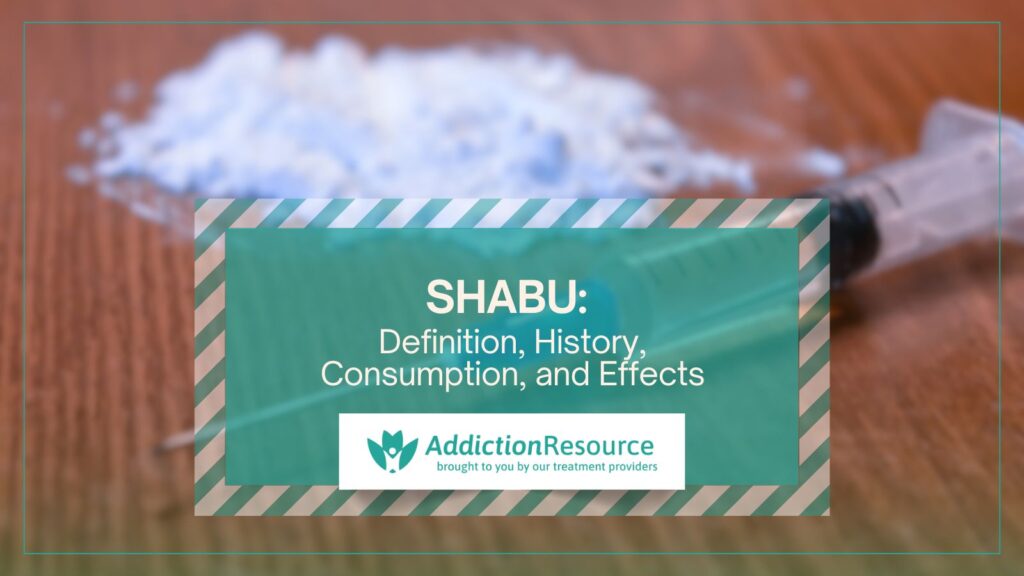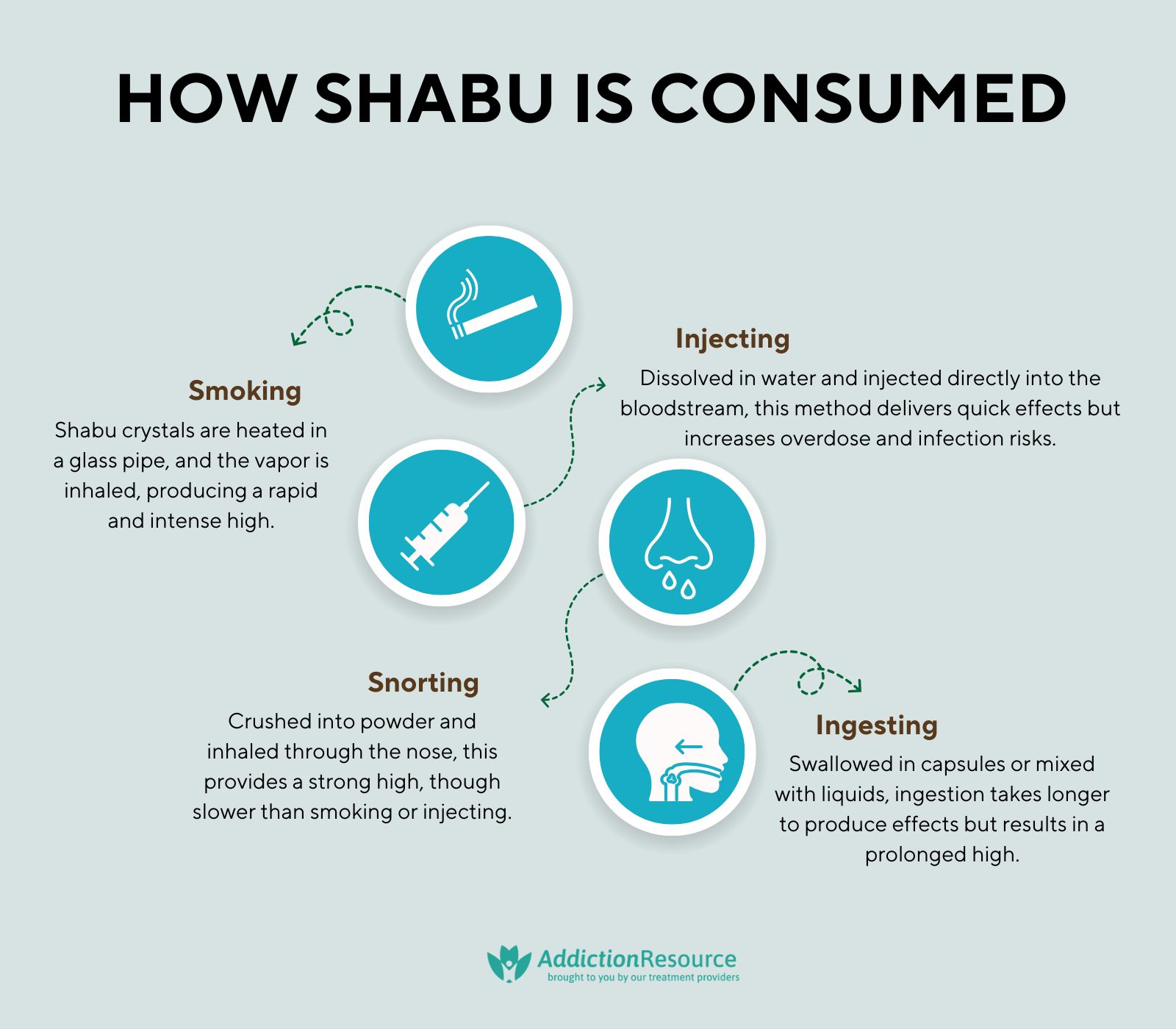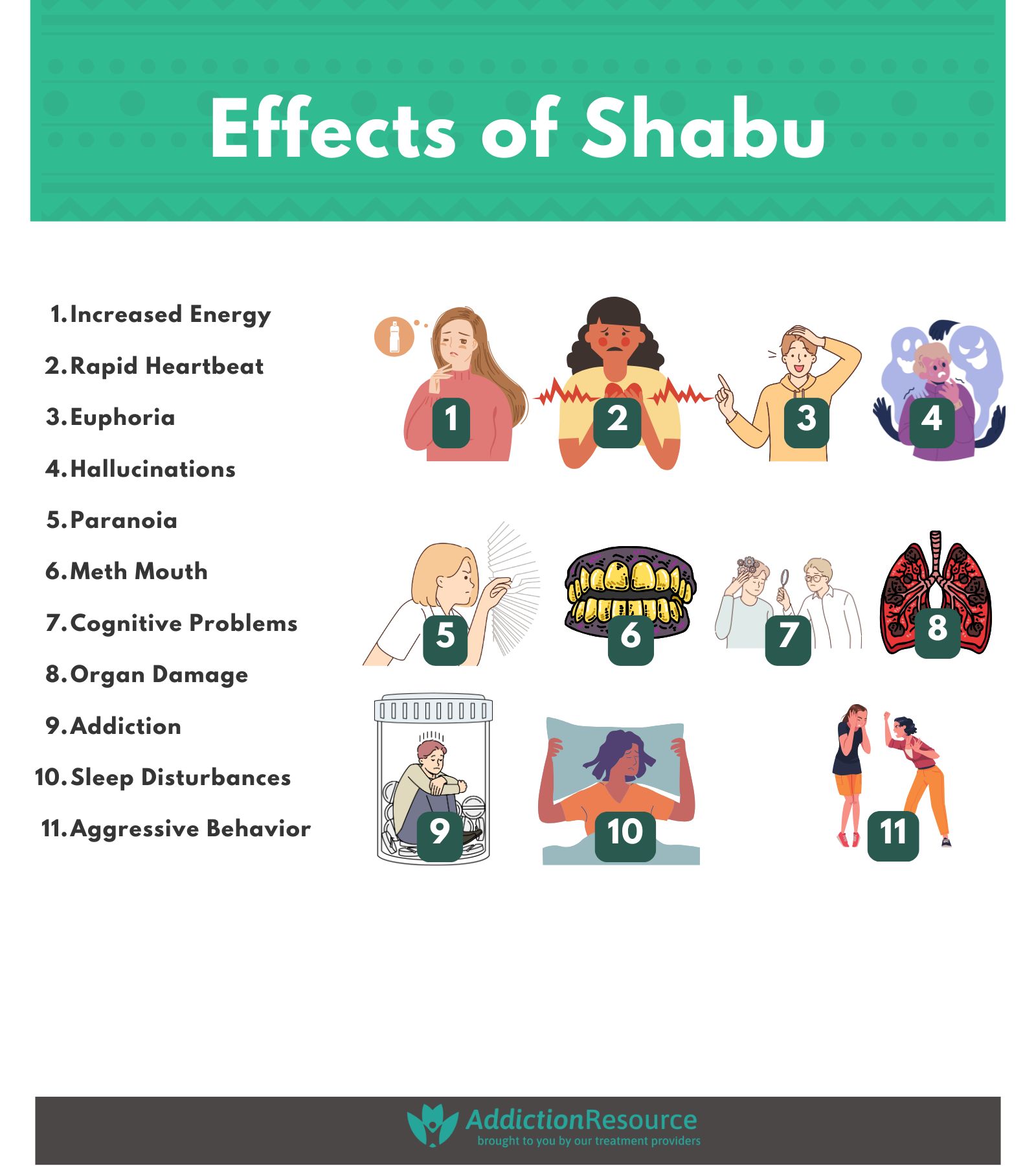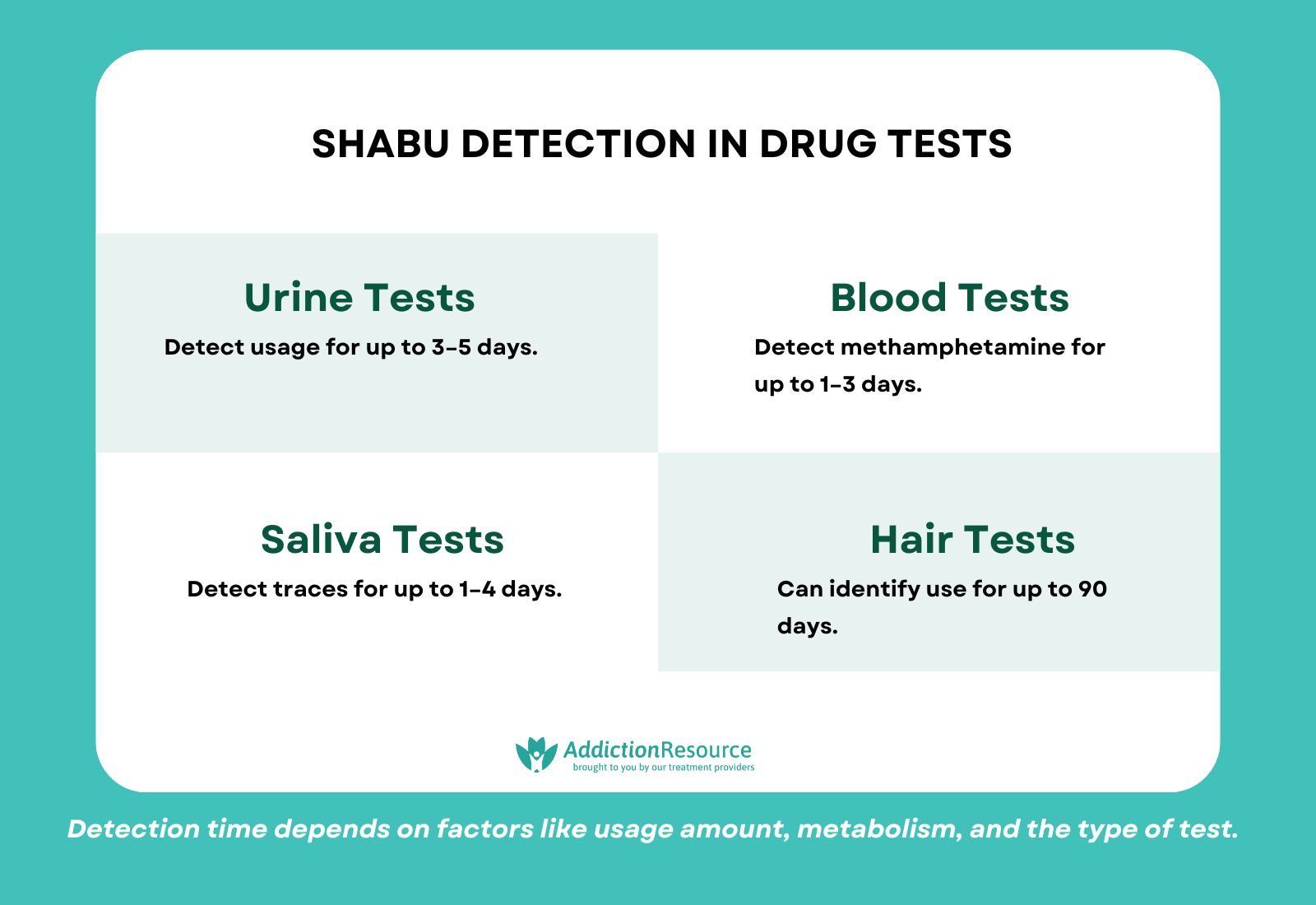Shabu: Definition, History, Consumption, and Effects

Shabu, known as meth, crystal meth, or methamphetamine, is an addictive and illicit stimulant drug. Shabu is used in the form of small, clear crystals or a crystalline powder. Shabu is referred to by other street names like ice, crack meth, or glass.
Methamphetamine, or shabu, was synthesized for medical purposes in the early 20th century in Japan, including treating narcolepsy and aiding weight loss. Shabu’s recreational use as an illicit drug began after World War II and became a public health issue in many countries.
Shabu is consumed by smoking, snorting, injecting, or swallowing the drug, depending on its form. The main effects of shabu include increased energy, rapid heartbeat, and euphoria. Prolonged shabu use leads to severe side effects such as hallucinations, paranoia, meth mouth, and the risk of addiction. The United Nations Office on Drugs and Crime reports that approximately 36 million people misuse amphetamine-type stimulants annually, including shabu.
Table Of Contents:
What is Shabu?
Shabu, scientifically known as methamphetamine hydrochloride, is a potent synthetic stimulant and illegal drug that affects the central nervous system. Shabu is a slang term for the drug “methamphetamine.” Shabu (meth) is classified as an amphetamine-type substance and is chemically derived from ephedrine or pseudoephedrine. Research published by the National Institute on Drug Abuse titled “Methamphetamine” defines shabu (meth) as a crystalline drug used recreationally due to its ability to induce euphoria, increased alertness, and energy surges. The misuse of shabu leads to severe physical and psychological harm, such as weight loss, organ damage, and mental health issues.
Shabu looks like clear crystals or crystalline powder and resembles shards of glass or coarse salt. Some street names for shabu are crystal meth, ice, glass, tik, speed, and crank. It is smoked, snorted, injected, or ingested, but smoking is the most used method due to its immediate and powerful impact on the user.
What is the Meaning of Shabu?
The meaning of shabu is derived from Southeast Asian slang, specifically referring to its crystalline form, which is easier to transport and distribute. Shabu is widely misused for its psychoactive effects and gives users a short but intense burst of energy and heightened mental focus. Methamphetamine hydrochloride was initially developed for therapeutic use, such as treating narcolepsy and ADHD. The term “shabu” is associated with the drug’s illicit and non-medical use, particularly in regions like the Philippines and Southeast Asia.
What is the History and Origin of Shabu?
The history and origin of shabu date back to the early 20th century in Japan, when chemist Nagai Nagayoshi first synthesized methamphetamine from ephedrine in 1893. Akira Ogata later developed a crystalline form called methamphetamine hydrochloride in 1919, which was used medically to treat narcolepsy and asthma, and as an appetite suppressant, according to the research titled “History of the methamphetamine problem” by M D Anglin, C Burke, B Perrochet, and E Stamper, published by the National Library of Medicine. Methamphetamine was given to soldiers during World War II to boost energy and alertness. Leftover supplies were distributed to civilians after the war, which caused its recreational use and addiction problems. The drug further spread worldwide and got names like crystal meth, ice, and shabu. Shabu became a common term for its crystalline form in Southeast Asia, particularly in the Philippines.
How do Shabu Drugs Work?
Shabu drugs work by stimulating the brain and central nervous system and releasing a large amount of dopamine, the chemical that makes you feel pleasure. This flood of dopamine provides a huge amount of energy, euphoria, and focus. Shabu quickly enters the bloodstream once consumed and reaches the brain, where it not only releases dopamine but also blocks its reabsorption, making the effects last longer. This overstimulation affects the heart and blood pressure and puts strain on the body. Regular shabu use changes how the brain works and makes it difficult for the body to feel good without the drug. This cycle of consuming the drug for pleasure leads to addiction, withdrawal symptoms, and long-term damage.
How is Shabu Consumed?

Shabu is consumed by smoking, injecting, snorting, or ingesting. These 4 methods of shabu consumption are listed below.
- Smoking: Smoking involves heating shabu crystals in a glass pipe until they vaporize and the user inhales the fumes. The smoking method produces an instant and intense high.
- Injecting: Injecting shabu means dissolving it in water and injecting it directly into the bloodstream. Injecting delivers the drug quickly and gives an intense effect but also increases the risk of overdose and infections.
- Snorting: Snorting requires crushing shabu into a fine powder and inhaling it through the nose. The effects are slower than smoking or injecting but still provide a strong high.
- Ingesting: Ingesting shabu means swallowing the drug, either in capsules or mixed with liquids. The ingestion method takes longer to work but has a longer high.
How Common is Shabu Drug Use?
Shabu drug use is very common in the US because approximately 1.5 million Americans aged 12 and older used methamphetamine in 2021, with 0.6% of the population meeting the criteria for methamphetamine use disorder, according to the 2023 research report by the National Survey on Drug Use and Health (NSDUH). Meth use is increasingly common among younger adults and underrepresented groups like Black individuals.
Overdose deaths from stimulants other than cocaine, primarily methamphetamine, nearly tripled between 2015 and 2019, while methamphetamine use itself grew by 43%, according to the research titled “Trends in U.S. methamphetamine use and associated deaths”, published by the National Institutes of Health. Frequent use (100+ days per year) increased by 66%, and methamphetamine use disorder (MUD) rose by 62%.
What are the Effects of Shabu?

The effects of shabu include increased energy, rapid heartbeat, euphoria, hallucinations, paranoia, meth mouth, cognitive problems, organ damage, addiction, sleep disturbances, and aggressive behavior.
These 11 effects of shabu are listed below.
- Increased Energy: Increased energy is a short-term effect where users feel a surge of alertness after consuming the drug. Increased energy is due to the heightened release of dopamine in the brain that leads to the overactivation of the central nervous system, as stated in the research titled “Methamphetamine” published by the National Institute on Drug Abuse.
- Rapid Heartbeat: Rapid heartbeat (tachycardia) is a short-term effect of shabu that leads to long-term cardiovascular issues, such as arrhythmias or heart attacks, according to the research titled “Effect of Methamphetamine Dependence on Heart Rate Variability” by Brook L Henry, Arpi Minassia, and William Perry.
- Euphoria: Euphoria is a short-term state of intense happiness. Euphoria results from the massive dopamine release by methamphetamine but often leads to dependency as users chase this feeling.
- Hallucinations: Hallucinations are a short-term effect but lead to long-term psychosis. Hallucinations occur when the brain misinterprets signals due to excessive stimulation, often causing users to hear or see things that aren’t real, as stated in the research titled “A Research of Methamphetamine Induced Psychosis in 1,430 Individuals With Methamphetamine Use Disorder” by Hong Gan, Yan Zhao, and Min Zhao.
- Paranoia: Paranoia refers to irrational fears or distrust despite the absence of harm in reality, which occurs after short-term shabu use and becomes persistent with long-term abuse, according to the research titled “Clinical features of methamphetamine-induced paranoia and preliminary genetic association with DBH −1021C→T in a Thai treatment cohort” by Rasmon Kalayasiri and Viroj Verachai.
- Meth Mouth: Meth mouth is a severe dental decay and gum disease, which is a long-term effect caused by dry mouth, poor oral hygiene, and teeth grinding often associated with methamphetamine use.
- Cognitive Problems: Cognitive problems, such as weak memory, difficulty concentrating, and poor decision-making, are long-term effects of the neurotoxic impact of methamphetamine on the brain, as stated in the study titled “Methamphetamine use causes cognitive impairment and altered decision-making” by Hiroyuki Mizoguchi and Kiyofumi Yamada.
- Organ Damage: Long-term use of shabu causes damage to essential organs like the heart, liver, and kidneys due to prolonged stress and toxicity. Methamphetamine use has been one of the major causes of liver damage, according to the research titled “Methamphetamine causes acute hyperthermia-dependent liver damage” by Laura E Halpin, William T Gunning, and Bryan K Yamamoto.
- Addiction: Addiction is both a short-term and long-term risk, as the intense euphoric effects of shabu make it highly addictive. Users often develop a tolerance and need higher doses to feel the same effects or trip.
- Sleep Disturbances: Sleep disturbances, such as insomnia is a short-term effect, as methamphetamine (shabu) stimulates the brain and users are unable to sleep. Shabu users stay up for days if they continuously consume the drug.
- Aggressive Behavior: Aggressive behavior and irritability occur for a short time after consuming the drug due to overstimulation of the nervous system.
What is the difference between shabu and crystal meth?
The difference between shabu and crystal meth is just in terminology and regions. Both names refer to the same substance: methamphetamine hydrochloride, a powerful and highly addictive stimulant. “Shabu” is a term used in Southeast Asia, particularly in the Philippines and Japan, and “crystal meth” is the term used in Western countries, including the United States.
What is shabu made of?
Shabu is made from methamphetamine hydrochloride, a synthetic chemical compound created through chemical reactions. Shabu is produced through various chemical processes involving substances like ephedrine or pseudoephedrine, which are found in over-the-counter decongestants. Shabu contains hazardous chemicals, including lithium, anhydrous ammonia, and hydrochloric acid, as stated in the study titled “Hazardous Chemicals in Illicit Methamphetamine and Amphetamine Laboratories” published by the New Mexico Environment Department. These substances are processed in illegal laboratories to create the crystalline form of methamphetamine, which is known as shabu or crystal meth.
Is Shabu Legal?
No, shabu is illegal in most countries, including the United States, the Philippines, and Japan. Methamphetamine, the active ingredient in shabu, is classified as a Schedule II controlled substance under the Controlled Substances Act in many places. It is illegal to manufacture, possess, or distribute shabu without proper authorization.
Is Shabu detected in drug tests?

Yes, shabu is detected in drug tests. Drug tests, such as urine, blood, hair, or saliva tests, detect methamphetamine use for up to 3 to 90 days after consumption. The detection time varies depending on the amount used, the user’s metabolism, and the type of test.
Does Shabu have any medical uses?
Yes, methamphetamine, the active compound in shabu, has some limited medical uses under the brand name Desoxyn, as stated in a report titled “Desoxyn® (methamphetamine hydrochloride tablets, USP)” by the FDA. Desoxyn is prescribed in certain medical cases, such as for ADHD (Attention Deficit Hyperactivity Disorder) and obesity, but its use is highly regulated due to its addictive potential. The form of methamphetamine used in medicine is much lower in potency and is strictly controlled, unlike the illicit shabu drug.
What are the symptoms of shabu overdose?
Symptoms of a shabu or meth overdose include severe agitation, chest pain, high blood pressure, increased body temperature, seizures, hallucinations, and violent behavior. Overdose leads to stroke, heart attack, or organ failure in extreme cases, resulting in death. It’s important to seek medical attention for anyone overdosing on shabu.
Is shabu abused in the Philippines?
Yes, shabu is abused in the Philippines. Shabu is the most commonly used illicit drug in the country, causing various social, health, and economic issues. Methamphetamine abuse has significantly affected Filipino communities, with a high percentage of drug-related crimes being linked to shabu use, according to the 2019 research titled “The Manila Declaration on the Drug Problem in the Philippines” by Nymia Simbulan and Leonardo Estacio. The Philippine government has launched several anti-drug campaigns to reduce its abuse.
Is shabu a Japanese drug?
No, shabu is not specifically a “Japanese” drug, but it has deep historical ties to Japan. The term “shabu” is derived from a Japanese slang for methamphetamine, which was first popularized there in the mid-20th century. Methamphetamine abuse has spread globally, including to the United States and Southeast Asia, but its association with Japan remains significant due to the drug’s history and cultural references in the country.
Hope Without Commitment
Find the best treatment options. Call our free and confidential helpline
Most private insurances accepted





